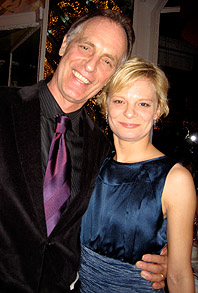
He was widely praised as the central asset of the 1991 Cy Coleman-Peter Stone-Adolph Green-Betty Comden musical The Will Rogers Follies, netting a Tony and Drama Desk nomination for his easygoing performance as the folksy title character. He was tapped to replace John Lithgow and Jonathan Pryce in Dirty Rotten Scoundrels. And if his Broadway debut in the original production of Hair wasn't necessarily important to the welfare of that musical, it had an impact on the theatre in another way — his pairing up with fellow cast member Shelley Plimpton produced one of the premiere stage actresses of the 21st century: Martha Plimpton. Carradine is currently making a surprise return to the New York stage in Anthony Horowitz's Mindgame at SoHo Playhouse. Surprise, because it's Off-Broadway, and because the play is a thriller — not a genre Carradine is known for — and because it's directed by controversial British filmmaker Ken Russell. The actor talked to Playbill.com about his new role, his old show and his daughter.
Playbill.com: We don't see you on the New York stage as often as we would like. How did you come to take on this project?
Keith Carradine: Well, I don't get to be on stage as much as I'd like. I live in California, which makes it hard. I learned of this play through a guy I knew through Hair, [producer] Michael Butler. I've known him through the years. He knows someone who's been involved with this play Mindgame and was looking for actors, and Michael mentioned me as being a good kind of actor for this piece.
Playbill.com: In this play you play a doctor at a hospital for the insane and you meet with a writer who wants to interview a serial killer who's housed in the hospital.
KC: The writer is interested in the nature of the serial killer. He's written books about the subject. He's written books about several serial killers. At one point, he says he's written books about Jeffrey Dahmer, about Andre Chikatilo. He's come to the institution because there's a notorious serial killer by the name of Easterman there. That is the essence of why he's there. He meets this doctor whom the writer will have to go through to get access to Easterman, to interview him. Easterman is pretty much in solitary confinement 24/7. But then things change a few times, and things start to not be what they seem. When I was reading the play, I would think, "Oh, that's what it is," and then something would change and I'd think, "OK, it's going that way," but it always kept me guessing. I never knew where it was going.
Playbill.com: This role doesn't sound like anything you've done before.
KC: It's not like anything I've done before. Not only the character, but the play itself. When I saw that, I couldn't resist.
Playbill.com: Have you ever worked with Ken Russell before?
KC: No. I've certainly been well aware of him over the years and been a huge fan. But I had never even met Ken before. Playbill.com: I guess when his name is attached to a project, you know it's going to be kind of interesting.
KC: (Laughs) At least.
Playbill.com: What's he like as a stage director?
KC: Well, his approach is not conventional. He doesn't approach the process of directing a play in a theatre-director way. But his point of view and sensibilities is 100 percent Ken Russell. All I can say is expect the unexpected.
Playbill.com: Should we expect something interesting in the design elements?
KC: Part of the design of the piece is written into it by the playwright. There are several aspects to the set; there are several changes that will occur during the course of the evening to underscore the nature of madness. The audience's perception of what is real and what is not will also be questioned. There are two acts, but it does take place in one confined space, which is my office.
Playbill.com: You began your stage career in the original production of Hair. Did you see the recent revival in Central Park?
KC: No, I was in California. I heard it was terrific.
Playbill.com: Are you surprised at all that this show is having this new life.
KC: Not really. The music is so great. The concept was very much of its time, but when you consider what's happening in the world today, it's like time stood still. Unfortunately, nothing seems to have changed much since 1969. But the music is so powerful. I never get tired of hearing those songs. I expect that's what's happening with this new generation. They recognize it as something with which they can identify.
Playbill.com: You write music. Have you ever thought of writing a musical?
 |
||
| Keith Carradine with Martha Plimpton |
||
| photo by Aubrey Reuben |
KC: She's been my excuse to come to New York for quite a while. She opens in a play at least twice a year.
Playbill.com: Now she can return the favor and come see you in something.
KC: Yeah, if we can work out the schedule!











